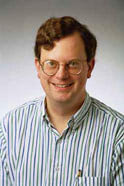- Undergraduate
Bachelor's Degrees
Bachelor of ArtsBachelor of EngineeringDual-Degree ProgramUndergraduate AdmissionsUndergraduate Experience
- Graduate
Graduate Experience
- Research
- Entrepreneurship
- Community
- About
-
Search
All Thayer News

Professor Ted Cooley
Location-Dependent Services and Pervasive Computing at Dartmouth
Mar 04, 2011
CONTACT: Catharine Lamm
603/646-3943
Dartmouth's wireless network offers the opportunity to employ recently developed position-determining devices and to offer many new and interesting location-dependent services. For example, if a student walks into a lab, his or her laptop computer could automatically display current project descriptions as well as equipment and safety information. Demonstrating this capability in an academic setting paves the way for commercial applications such as receiving a menu and lunch specials on your PDA as you approach a restaurant.

Professor Ted Cooley
Recently, Dartmouth Engineering Professor Ted Cooley teamed up with Boston's Newbury Networks to install Newbury's Locale Points within Cummings Hall, home to Dartmouth's Thayer School of Engineering. Thayer School students Max Crossley, Ian Gregorio, and Jonathan (Yijin) He then completely overhauled and updated the basic prototype and got it up and running. They are now working with Newbury to iron out any kinks in the system so that users with a wireless-enabled TabletPC, notebook, or PDA can be pushed Web content relevant to their location—ie. welcome info for someone standing in the reception area, or trouble-shooting tips for someone working in a computer lab. It's a win-win situation: the Dartmouth community gets access to cutting-edge technology, and Newbury Networks gets a free, controlled test-bed. "The beauty of testing the system here," says Professor Cooley, "is that we [Thayer School] own the network end to end. So bugs can't hide."
A current project aimed at taking advantage of this location-specific technology is called Multimedia Techniques for Engineering Instruction (MTEI). Depending on the hour of the day, and the room in which the students are located, course materials are pushed to the students via their Web browsers. The students can then annotate the lecture notes, follow links to relevant web sites, view video clips and stills, etc. Further, the instructor can query the students in two modes, authenticated and anonymous. With the former, students can answer multiple-choice questions for credit. With the latter, students can answer whether they understand a particular point from class. The anonymous results are then tallied and displayed as instant feedback for the instructor. "We call it the 'clue meter,'" says Cooley.
David Kotz, Associate Professor of Computer Science at Dartmouth, is also investigating the potential for "context-aware mobile computing" in his development of software infrastructure supporting pervasive-computing applications that maintain an awareness of the changing context in which they function. He and his students are moving on this in three directions: 1) improving the precision of location estimates using the campus wireless network; 2) developing a flexible and secure infrastructure to collect, process, and disseminate information to context-aware applications; 3) prototyping context-aware applications, both in a campus setting and in emergency-response scenarios.
# # #
For contacts and other media information visit our Media Resources page.
